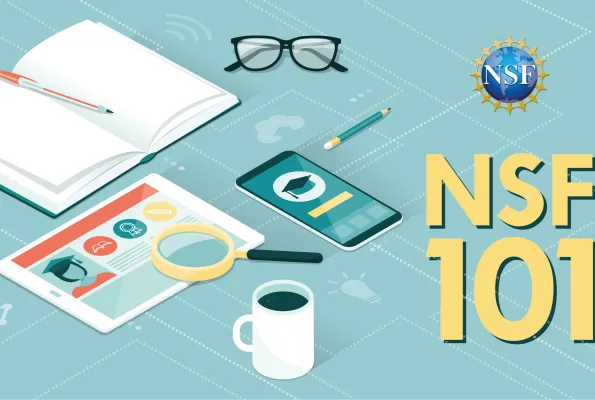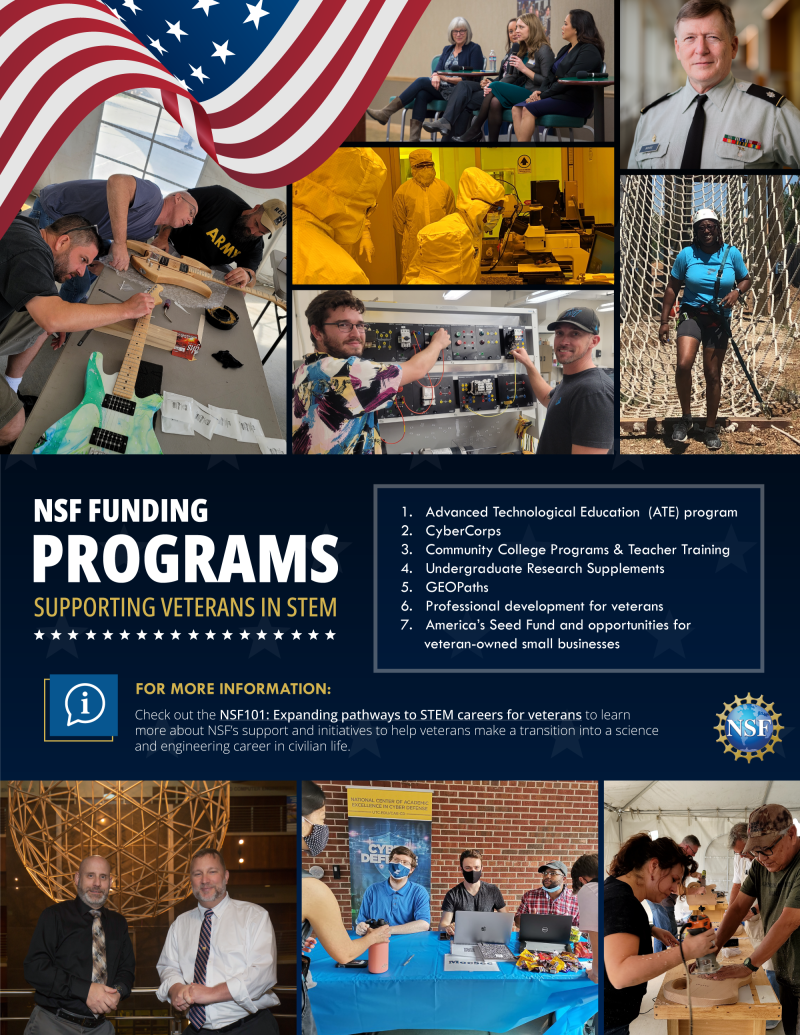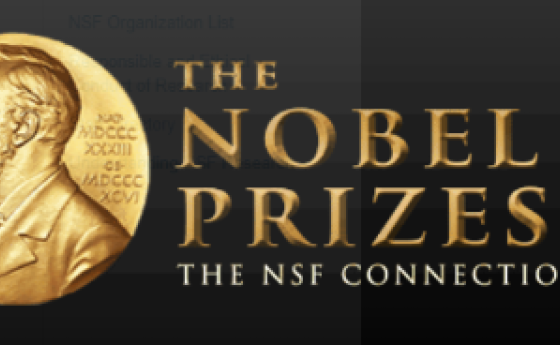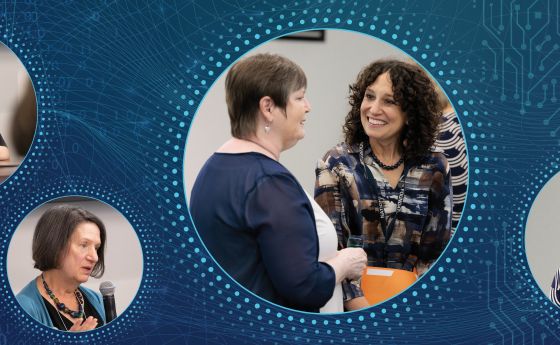
NSF 101: Expanding pathways to STEM careers for veterans
Every year, approximately 200,000 men and women leave U.S. military service and return to civilian life. NSF is committed to making sure that our nation’s veterans have pathways into STEM education and careers.
The Supporting Veterans in STEM Careers Act, signed into law in 2020, directs NSF to "encourage veterans to study and pursue careers in STEM and computer science". As such, NSF offers several programs and initiatives to help veterans transition into a science and engineering career. As of a review in June 2020, there were 275 NSF projects, in more than 100 programs across all directorates, that feature veterans. Below are just some of the resources for veterans wishing to enter a STEM career.
1. Advanced Technological Education program
The Advanced Technological Education program supports the education and training of technicians via partnerships among academic institutions, industry, and economic development agencies. Several initiatives under this program help to support veterans. For example, the VetTEC initiative targets both transitioning veterans and active-duty military to translate technical skills learned in the military to civilian certifications and jobs in the aviation, aerospace and technology industries. More details about VetTEC opportunities can be found here.
The program also funds the Northeast Advanced Technological Education Center, which partners with Fort Drum Army base in New York and multiple organizations in the semiconductor and nanotech industries, to train veterans for work in advanced manufacturing practices, mechatronics and pneumatics.
Some military veterans say that it is challenging to translate the skills they acquired during service to civilian settings. One area where military service often provides valuable skills is in mapping and geospatial technologies. NSF informal learning events called "mapathons" are mapping exercises that enable participants to collect geospatial data using their skills acquired during military service, which can be used to address needs in their local communities. These mapping exercises show veterans how they can use their military skills in civilian careers.
2. CyberCorps
The CyberCorps Scholarship for Service program recruits and trains the next generation of cybersecurity professionals for federal, state, local and tribal governments. After graduation, all scholarship recipients work for a federal, state. local, or tribal Government organization in a position related to cybersecurity for a period equal to the length of the scholarship. There are also large number of programs around the country, that provide scholarships or other tangible support for veterans who want to pursue careers in cybersecurity, associated with both community colleges (via the Community College Cyber Pilot program) and universities (a list of participating institutions can be found here).
Other CyberCorps initiatives focusing on veterans include a program at the University of Kansas that seeks to broaden the participation of diverse and underrepresented groups in cybersecurity. It focuses specifically on recruiting veteran, active-duty and non-scholarship Reserve Officer Training Corps students, because of their proximity to and established relationship with the U.S. Army's Midwest Regional Network Enterprise Center at Fort Riley and the Kansas Air National Guard in Wichita.
There is a wide range of similar CyberCorps programs around the country (a list of these programs can be found here) and most of them actively encourage veterans to apply, although there are some programs that are specifically for veterans.
3. Community College Programs & Teacher Training
In 2017, an NSF survey reported that roughly 3.7 million college graduates (of which 57% were community college attendees) had served on active duty in the U.S. Armed Forces in the past, with nearly 250,000 graduates currently serving in the military – making roughly 6% of colleges graduates are veterans or active military.
NSF supports several community college initiatives to help recruit and support veterans who wish to take STEM undergraduate courses. One example is the partnership between East Los Angeles College (a Hispanic-serving community college) and the University of California, Los Angeles (a research university), to offer internships, counseling and classroom performance interventions that focus on supporting and guiding veterans through STEM programs and helping to provide for their unique needs.
There are many similar programs and initiatives in other locations - ask your community college careers councilor or admissions office about which programs are available to you.
For veterans with strong mathematical skills who want to become teachers, Mercy University in New York offers an NSF program that helps prepare veterans for mathematical education studies and provides scholarships to fund their training to become mathematics teachers for grades 7-12. The coordinator of the project is a veteran, and many of the veterans who have received scholarships through the program have secured permanent teaching positions.
As with colleges, ask the teacher training program that you are interested in whether they offer NSF-funded opportunities that you can apply for.
4. Undergraduate Research Supplements
For veterans pursing undergraduate degrees in STEM fields, there are several opportunities to showcase their talents and increase their research experience. For example, the Veterans Research Supplement Program connects veterans who are students (undergraduate or graduate), K-12 teachers or community college faculty with active NSF engineering grant recipients, to work on research projects.
5. GEOPaths
The “GEOPaths” program includes several initiatives throughout the US that support underrepresented minorities, veterans and disabled students who wish to gain experiences in geosciences from geology to oceanography and even polar science.
6. Professional development for veterans
In addition to supporting students through scholarships or providing training or research opportunities, NSF is advancing research that investigates what helps veterans get ahead in STEM careers. Theodora Chaspari and colleagues at Texas A&M University are using artificial intelligence to develop veterans' interviewing skills, in particular when applying for jobs in fields such as computing. In addition to offering training for interviews, the project provides educational materials that veterans can use to highlight for potential employers the strengths that they developed in the military, such as commitment, reliability and sense of duty.
7. America’s Seed Fund and opportunities for veteran-owned small businesses
According to the 2020 Annual Business Survey- which is sponsored by NFS’s National Center for Science and Engineering Statistics – there were 331,151 veteran-owned businesses, which is nearly 6% of all small businesses. These veteran-owned businesses took in $963 billion in receipts and had an estimated 4.0 million employees who were paid $192 billion. This means that Veteran-run small business are an important sector of the US economy.
America’s Seed Fund is an NSF program that awards over $200 million to over 400 small businesses every year, providing up to $2 million to individual science and engineering start-up companies. While NSF provides funding, the grantee still retains full control over their company and intellectual property, as the award is intended to promote innovative research and development, in science and engineering, by small businesses. Since 2012, nearly 3,400 start-ups and small businesses have been supported, and the wide variety of the scientific fields these companies have specialized in can be seen here. Veterans are especially encouraged to apply for these awards.
NSF wants you!
NSF encourages veterans to apply for positions and provides training, mentoring and support for staff who are veterans. There are veterans at NSF from multiple branches of the military, directly involved with facilitating the performance of science in the U.S. as well as formulating national science policy.
For more information about working for NSF as a veteran, the agency will be participating in the National Federal Career Fair (Nov. 19, noon-3 pm EDT), which is hosted by the Department of Veterans’ Affairs and supported by up to 30 government agencies (click here to register).
NSF recognizes that the reliability, leadership and other skills instilled by military service complement and enhance the effectiveness of our staff who are veterans, and we are grateful for their service.




